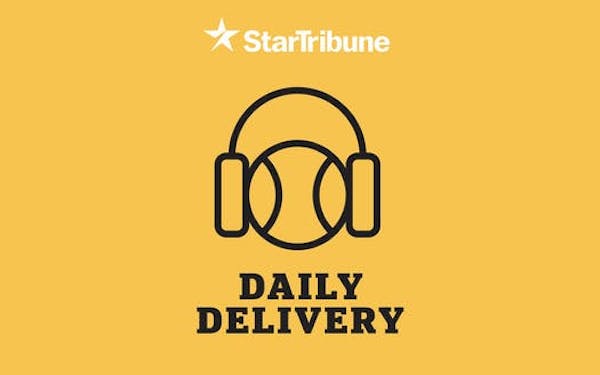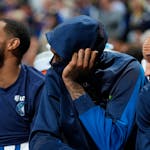 See
more of the story
See
more of the story
A fascinating NFL offseason of quarterback rumors and movement added another layer Thursday when the Eagles reportedly traded Carson Wentz to the Colts for two draft picks.
The Eagles will receive at least a third-round pick (2021) and second-round pick (2022), and that second-rounder will become a first-rounder if Wentz plays at least 75% of the team's offensive snaps next season — which would likely signify that he was both healthy and effective.
It's an interesting deal from a number of perspectives, and it's easy to see how it makes sense from both sides.
The Eagles take a massive dead money hit on their 2021 cap from bonuses owed to Wentz — $33.8 million, the largest such cap hit in NFL history — but they walk away in 2022 and beyond with clean books. And their 2021 problem is mitigated somewhat by the likelihood that Jalen Hurts (with his bargain $1.4 million cap hit on a rookie deal) will be the starter. By 2022, if Hurts plays well, the Eagles could be well positioned on their salary cap and have two nice draft picks from the Colts.
The Colts needed a quarterback after Philip Rivers provided a successful one-year bridge before he retired. For an acquiring team, Wentz's contract was far less onerous than it was for the Eagles. He has a cap hit with the Colts of $25.4 million in 2021, which will seem high if he plays like he did in 2020 but will seem somewhere from OK to a bargain if he returns to pre-2020 form.
If the former North Dakota State standout excels, the Colts have him for three more years at cap hits of $22 million, $25 million and $26 million. If he flops, they can release him after this season with no guaranteed money and therefore no cap penalty. All they would have lost were a couple of draft picks.
That contract looked awful in Philadelphia when he floundered last season because it included the $33.8 million bonus spread out over it. For the Colts or any other team that traded for Wentz, it's quite reasonable — which might explain how the Eagles seemed to get a pretty good haul for a quarterback who looked lost last season.
Now: If you're a Vikings fan who still dreams of a Kirk Cousins trade and starting over at that position, you're probably wondering how the Wentz trade relates to Cousins.
The short answer: It's complicated.
Any team acquiring Cousins in a hypothetical trade would be on the hook for a $21 million hit in 2021 (quite reasonable) and $35 million in 2022 (not quite so reasonable). The Vikings would take a $20 million dead money hit in 2021 for a signing bonus that for now counts $10 million in each of the next two seasons (accounting for Cousins' overall cap hit, as it stands now with the Vikings, of $31 million in 2021 and $45 million in 2022). That 2022 salary, as our Ben Goessling has reported over and over, becomes fully guaranteed next month.
Paying Cousins an average of $28 million over the next two years, though, isn't really too bad. And any team that acquired him would likely be interested in reworking his contract with an extension after the 2021 season — or, if he underperformed, letting him just play it out.
Wentz's traded contract is more favorable than Cousins' would be since it has one fewer year of guaranteed money and has lower cap hits overall.
But Cousins also offers things Wentz doesn't. While I would say Wentz's ceiling is higher than Cousins' ceiling — he's younger and played at an MVP level in 2017 before a late-season injury for the eventual Super Bowl champion Eagles — his 2020 season demonstrated that his floor is lower. Wentz threw 15 interceptions with just 16 touchdowns and finished as Pro Football Focus' No. 26 graded qualified passer (Cousins, by contrast, was No. 9).
And Cousins has a very clean injury history, having started every game for either Washington or Minnesota over the last six seasons except the 2019 finale when he rested with a playoff spot locked in. Wentz has had a variety of injuries that have limited both his availability and effectiveness. He's missed at least three starts in three of the last four seasons.
For all those reasons, it's hard to draw a straight line between the Wentz trade value and what it might be for Cousins. Wentz has a better contract and more upside. Cousins offers the greater potential for a sure thing as a long-term fit.
Here's how I would look at it: If you think Cousins' production in 2021 will at least equal that of Wentz — which is a good bet — he seems like he is worth at least a first-round pick in a trade based on the price paid for Wentz.
The Vikings, in a hypothetical trade to fill their sudden QB vacancy, could package that pick and their own (and maybe a little more) to move up high enough to draft their QB of the future — perhaps, even ironically, another NDSU QB: Trey Lance.
Then again, if we are bringing all this full circle even more, we must consider this amazing tweet from Field Yates:
Two of those 22: Christian Ponder (2011) and Teddy Bridgewater (2014) with the Vikings. Drafting your QB of the future always sounds like a good idea, but that staggering 0 for 22 number shows how quickly and often that future becomes the past.
There is comfort in the known, and there's something to be said for stability. But in an offseason of QB volatility, thinking about a shakeup is only natural.






